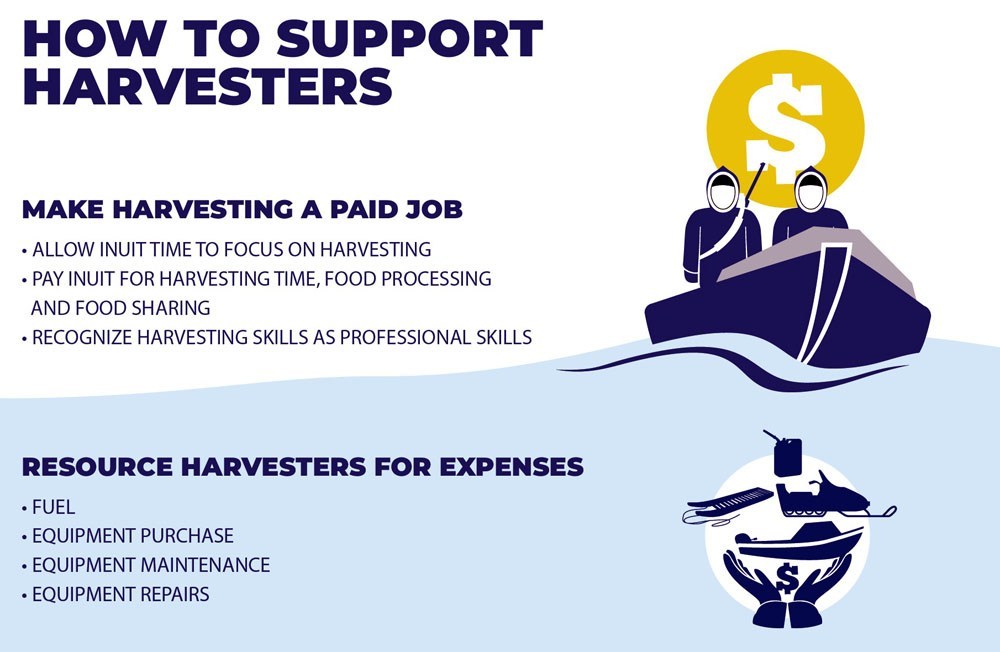Canadian Inuit organization says food harvesting should be a paid job
Qikiqtani Inuit Association is suggesting the move as part of a shift from advocating for “food security” to advocating for “food sovereignty.”

Country food harvesting must become a form of paid employment, the Qikiqtani Inuit Association said in a report released at its recent board meeting in Iqaluit.
“Our goal is for every Inuk in the Qikiqtani Region to have stable and long-term access to locally harvested country food,” QIA says.
QIA’s proposal doesn’t give any dollar figures describing how much they believe hunters should be paid.
But they say that paying hunters to hunt, as well as paying for hunting-related expenses like fuel and equipment, would give Inuit more time to focus on harvesting and would recognize harvesting skills as professional skills.
QIA does not provide any estimates on the additional quantities of country food that would be produced were harvesters paid to hunt.
And the report doesn’t say how the proposal would mesh with the Nunavut-wide harvesters support program that Nunavut Tunngavik Inc. administers.
But QIA says Nunavut needs a shift in thinking, from “food security” to “food sovereignty.”
“This means empowering Inuit to feed our own communities,” QIA said.
As for a definition of “food sovereignty,” QIA says it comprises four rights:
• The right to healthy and nutritious food
• The right to culturally appropriate food
• The right to “food harvested through ecologically sound and sustainable methods”
• The right to access wildlife in ways that empower communities.
And they refer to oft-repeated statistics that reveal the extent of hunger and malnutrition within Nunavut families.
“Current approaches to remedy this crisis, such as providing subsidy on imported foods, are not working,” the report says.
That includes the Nutrition North Canada program, which, QIA says, fails to meet its objectives.
For example, because Nutrition North does not subsidize hunting, fishing and harvesting equipment, this creates a “systemic barrier” to the cultivation of local food systems.
Another reason they don’t like Nutrition North is that it gives preference to “factory farmed animal protein rather than locally harvested country food.”
They also complain Nutrition North is “market-driven” and treats food as a commodity rather than a basic human right.
And QIA repeats allegations that NTI and Inuit Tapiriit Kanatami have made in the past: that Nutrition North lacks transparency.
“Nutrition North does not require that landed freight costs of food and the profit margin collected by retailers be made publicly available, making it impossible to determine if the subsidy is passed on to consumers,” QIA says.
Last December, the federal government announced that, through Nutrition North, they’ll spend $62.6 million over five years, starting April 1, 2019, to help country food harvesters.
So far, the federal government hasn’t provided any details on how it will distribute that money, and QIA doesn’t discuss the new program in its report.
But QIA does say Nunavut needs to re-establish “the centrality of the hunting economy.”
“Our people, those of us who would be hunters, are under intense and undue pressure to conform to the global market economy in ways that disconnect us from our lands and animals.”
To achieve “food sovereignty,” QIA says governments should renew their policies and funding models and spend money on the following:
• Marine infrastructure, especially more small-craft harbours
• Country food processing plants
• Multi-use facilities, such as equipment warehouses and office space related to harvester programs
• A training centre for Qikiqtani Inuit to get training for jobs in food harvesting, conservation and parks management
The QIA report on food sovereignty and harvesting is connected to another report that the organization released last week: its submission to the federal government on the development of a new northern policy framework.
In it, they propose developing a “conservation economy,” defined as economic wealth derived from local natural resources in line with Inuit Qaujimajatuqangit and local needs.